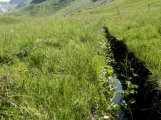 |
|
|
|
|
|
|
The impact of domestic livestock (grazing, mechanical impact as well as impact on nutrient availability) is to a large extent dependent on management. To maintain the ecological stability of alpine pastures, the alpine farmer must be both knowledgeable and willing to exert considerable effort. Over the centuries, farmers have accumulated experience in the sustainable management of alpine pastures (e.g. optimal stocking rates, rotational practices, appropriate duration of use of alpine pastures). In addition to herding the animals, alpine farmers have invested a great deal of effort in maintenance practices including the removal of weeds, collection of stones, and repair of damaged turf by cutting and transplanting turf. Very often, this experience was the basis for local laws regulating the use of alpine pastures. |
|
Because surface runoff on pastures is higher than in intact forests, there is increased danger of surface erosion. To counteract this, maintenance of a drainage system is needed. |
1 - Well maintained drainage ditch (100K) |
|
Alpine ecosystems are very susceptible to disturbance through soil erosion, mudslides and avalanches, and these factors can be exacerbated by agriculture. Good management is essential to minimise these problems. Similarly, species diversity and fodder quality are high in well-managed alpine pastures, but bad management leads to the spread of unpalatable species. Traditional management of alpine pastures is characterised by substantial labour and enough personal. Due to economic reasons and personnel shortage, today many alpine pastures are threatened by intensification or abandonment; both tend to reduce the ecological diversity of these areas. |
29 August 2011 |
||
| |
||
